
Toxicology and Environmental Health Sciences
Scope & Guideline
Bridging Research and Practice in Environmental Health Sciences
Introduction
Aims and Scopes
- Toxicological Mechanisms and Pathways:
Research exploring the molecular and cellular mechanisms by which toxic substances exert their effects on biological systems. This includes studies on oxidative stress, apoptosis, and the role of specific pathways in mediating toxicity. - Environmental Contaminants and Public Health:
Investigations into the effects of environmental pollutants, such as heavy metals, pesticides, and microplastics, on human health. This encompasses risk assessments, epidemiological studies, and health implications of exposure. - Animal Models in Toxicology:
Utilization of various animal models to study the effects of toxic substances, focusing on behavioral, physiological, and histopathological changes. This includes research on rodent models, aquatic species, and other organisms. - Natural Products and Phytochemicals:
Studies on the protective effects of natural compounds and plant extracts against toxicity, emphasizing their potential in therapeutic applications and as alternatives to synthetic chemicals. - Nanotoxicology:
Research focused on the toxicity of nanomaterials and their interactions with biological systems, highlighting both their potential applications and risks associated with exposure. - Occupational and Environmental Health:
Exploration of health risks associated with occupational exposures to chemicals and pollutants, emphasizing preventative strategies and regulatory recommendations.
Trending and Emerging
- Microplastics and Nanomaterials:
There is a significant increase in studies investigating the effects of microplastics and nanomaterials on health and the environment, highlighting their pervasive presence and potential risks. - Chemical Mixtures and Synergistic Effects:
Research focusing on the combined effects of multiple chemicals, rather than single agents, is on the rise. This trend underscores the complexity of real-world exposures and the need for comprehensive risk assessments. - Endocrine Disruptors and Reproductive Health:
The impact of endocrine disruptors on reproductive health is becoming a prominent theme, with a particular focus on developmental and long-term effects stemming from early-life exposures. - Climate Change and Toxicology:
Studies linking climate change factors, such as temperature fluctuations and altered precipitation patterns, to toxicological outcomes are emerging, reflecting the intersection of environmental science and toxicology. - Biomarkers of Exposure and Effect:
There is an increasing emphasis on identifying and validating biomarkers that indicate exposure to toxic substances and the biological effects of such exposures, enhancing the ability to assess risk and health impacts. - Phytochemicals as Protective Agents:
Research into the protective roles of phytochemicals against environmental toxins is gaining momentum, showcasing the potential of natural products in mitigating toxic effects.
Declining or Waning
- Traditional Chemical Toxicology:
Research focused solely on the toxicity of well-characterized chemical agents without consideration of newer methodologies or holistic approaches. There appears to be a shift towards integrating multi-faceted approaches that include environmental and biological interactions. - Single-Agent Toxicity Studies:
Studies examining the toxicity of individual chemicals in isolation are becoming less common. There is a growing trend towards investigating combined exposures and interactions among multiple contaminants. - Historical Environmental Contaminant Studies:
Research that primarily focuses on older contaminants, such as legacy pollutants, is declining as newer and emerging contaminants gain attention in the context of current environmental and health concerns. - In Vitro Studies with Limited Relevance to In Vivo Scenarios:
While in vitro studies remain valuable, there is a noticeable decrease in studies that do not correlate with in vivo findings or fail to address the complexity of whole-organism responses.
Similar Journals

TOXICOLOGY AND APPLIED PHARMACOLOGY
Navigating the Nexus of Safety and EfficacyTOXICOLOGY AND APPLIED PHARMACOLOGY, published by Academic Press, Inc. Elsevier Science, stands as a leading journal in the domains of toxicology and pharmacology, with its establishment dating back to 1959. With an impact factor reflecting its academic rigor and relevance, this journal is classified in the Q2 quartile for both pharmacology and toxicology categories, underscoring its significance in the scientific community. It ranks #34 out of 133 in Toxicology and #95 out of 313 in Pharmacology according to Scopus, placing it within the 74th and 69th percentiles, respectively. The journal aims to disseminate quality research that drives advancements in understanding the interactions of drugs and toxic substances within biological systems. Researchers and professionals are invited to contribute and engage with a broad spectrum of articles that cover mechanistic studies, risk assessment, and innovative therapeutic strategies. Although the journal does not offer open access, it continues to be a crucial resource for those who seek to navigate the complex interface of drugs and their toxicological implications.
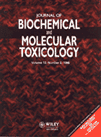
JOURNAL OF BIOCHEMICAL AND MOLECULAR TOXICOLOGY
Unraveling the Complexities of Molecular ToxicologyJournal of Biochemical and Molecular Toxicology, published by Wiley, plays a pivotal role in the advancement of knowledge within the fields of biochemistry, toxicology, and molecular biology. Established in 1998, this esteemed journal has garnered a significant reputation, evidenced by its current placement in the Q2 quartile across several categories, including Biochemistry, Health, Toxicology and Mutagenesis, and Medicine. With an ISSN of 1095-6670 and an E-ISSN of 1099-0461, it serves an international audience, offering critical insights and innovative research that shape our understanding of biochemical interactions and toxicological assessments. While it does not operate on an open-access model, the journal ensures rigorous peer review and high-quality publication standards, making it a valuable resource for researchers, professionals, and students dedicated to the exploration of molecular toxicology. The journal's recognized impact within the scientific community is reflected in its competitive rankings among specialized journals, fostering significant contributions to both academic and applied contexts.
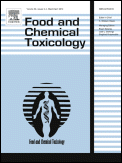
FOOD AND CHEMICAL TOXICOLOGY
Exploring the critical links between food safety and public health.FOOD AND CHEMICAL TOXICOLOGY, published by Pergamon-Elsevier Science Ltd, is a prestigious journal with a significant impact in the fields of food science, medicine, and toxicology, reflecting its Q1 and Q2 quartile rankings in various categories as of 2023. Established in 1982, this journal continues to serve as an essential platform for disseminating high-quality research focused on the toxicological assessment of foods and chemicals, aiming to advance knowledge that affects public health and safety. With a pivotal role in integrating diverse disciplines, including pharmacology and agricultural sciences, the journal ranks impressively within the top percentiles—specifically 95th in Toxicology and 92nd in Food Science on the Scopus metrics. Though it operates on a traditional subscription model, the journal is committed to providing valuable insights and findings to researchers, professionals, and students across the globe, making it a vital resource in the ongoing discourse around food safety and environmental health. Its comprehensive scope underscores its importance in shaping evidence-based policies and practices.

Frontiers in Toxicology
Exploring the Depths of Toxicological ResearchFrontiers in Toxicology, published by Frontiers Media SA, is a prominent open-access journal dedicated to advancing the understanding of toxicological science. Established in 2019, it serves as a vital forum for innovative research, offering insights into the pharmacological impacts and toxicological profiles of various substances. With its international reach based in Switzerland, this journal has quickly ascended in the academic community, achieving a notable Q1 ranking in Pharmacology, Toxicology and Pharmaceutics (Miscellaneous) and a Q2 ranking in Toxicology as of 2023. The journal is indexed in Scopus, where it ranks #8 out of 43 in its primary category, underscoring its influence and relevance in the field. The scope encompasses cutting-edge studies on the mechanisms of toxicity, including both human and environmental impacts, making it an essential resource for researchers, professionals, and students alike. By promoting open access to high-quality research, Frontiers in Toxicology plays a crucial role in enhancing knowledge sharing and fostering collaboration across disciplines.
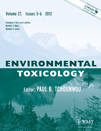
ENVIRONMENTAL TOXICOLOGY
Advancing the Science of Environmental SafetyENVIRONMENTAL TOXICOLOGY, published by Wiley, is a premier academic journal dedicated to the multifaceted study of toxic substances in the environment and their effects on human health and ecosystems. With the ISSN 1520-4081 and E-ISSN 1522-7278, this journal holds a prestigious position in the field, being ranked in the Q1 category across various relevant disciplines, including Health, Toxicology and Mutagenesis, and Management, Monitoring, Policy and Law. The journal regularly publishes high-quality research articles, reviews, and policy discussions aimed at understanding the implications of environmental toxins from 1980 to the present, contributing to the body of knowledge critical for the safety and sustainability of our environment. Researchers and professionals will find a treasure trove of information that not only highlights current trends and methodologies but also sets the stage for future advancements in toxicology. As a key resource, it provides valuable insights necessary for policy-making, environmental management, and public health, reinforcing its significance in the ever-evolving fields of toxicology and environmental science.
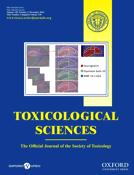
TOXICOLOGICAL SCIENCES
Innovating Understanding in Toxicological SciencesTOXICOLOGICAL SCIENCES, published by Oxford University Press, is a premier journal in the field of toxicology that has been a cornerstone of scientific discourse since its inception in 1981. With an impressive 2023 impact factor and ranked in the Q1 category for Toxicology, this journal is highly regarded among researchers, professionals, and students dedicated to pharmacology and toxicology. The journal is committed to advancing the understanding of toxicological science, covering a breadth of topics that include the mechanisms of toxicity, risk assessment, and the regulatory aspects affecting public health. With an ISSN of 1096-6080 and an E-ISSN of 1096-0929, TOXICOLOGICAL SCIENCES facilitates open access scholarly work, ensuring that critical research reaches a global audience and promotes collaborative learning. As it converges towards 2024, the journal remains pivotal in shaping the future of toxicology research, providing insights that are essential for developing safer chemicals and protecting environmental health.
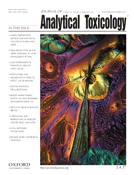
JOURNAL OF ANALYTICAL TOXICOLOGY
Exploring the Depths of Toxicological ScienceJOURNAL OF ANALYTICAL TOXICOLOGY, published by Oxford University Press Inc, stands as a leading platform in the field of analytical chemistry and toxicology, focusing on the rigorous exploration of methodologies and advancements in the detection of toxic substances. Since its inception in 1977, this journal has continually contributed to the scientific community, providing researchers and professionals with vital insights into chemical health, safety, and environmental implications. With an impressive Q1 ranking in both Analytical Chemistry and Chemical Health and Safety, along with reputable Q2 rankings in Environmental Chemistry and Toxicology, the journal maintains its critical standing in vibrant academic communities, ensuring the dissemination of high-quality research. Although it currently does not offer open access, articles are made available via institutional subscriptions, allowing widespread access to its valuable findings. Located in the United States, the journal contains a wealth of knowledge poised to benefit scientists and scholars engaged in toxicological research, emphasizing its importance in enhancing public health and safety.

Toxicology Research
Exploring the intersection of health and environment.Toxicology Research is a distinguished journal dedicated to advancing the field of toxicology through the dissemination of high-quality research. Published by Oxford University Press, this UK-based journal focuses on critical aspects of toxicology and mutagenesis, highlighting both environmental and pharmacological implications. With an ISSN of 2045-452X and an E-ISSN of 2045-4538, it serves as a valuable resource for researchers, professionals, and students alike. Currently categorized in the Q3 quartile for Health, Toxicology and Mutagenesis, as well as Toxicology in 2023, Toxicology Research maintains a visible presence in Scopus rankings, positioning itself within the targeted professional community. Although the journal operates without open access options, its importance in contributing to scientific discussions and policy formation is undeniable. Covering content from 2012 to 2024, it continues to provide insights into contemporary toxicological challenges, thereby fostering interdisciplinary collaborations and informing best practices in health and safety.

Exposure and Health
Innovating research to inform global health practices.Exposure and Health is a pioneering journal published by Springer, specializing in the interdisciplinary fields of health, toxicology, and environmental sciences. With an ISSN of 2451-9766 and E-ISSN of 2451-9685, this open-access journal exemplifies a commitment to disseminating high-quality research that informs public health practices and policies globally. Situated in the Netherlands, it boasts an impressive impact factor and ranks in the top quartile (Q1) across multiple categories in the 2023 Scopus rankings, including Health, Toxicology and Mutagenesis, Pollution, and Water Science and Technology. The journal is dedicated to advancing knowledge on the interactions between environmental factors and health outcomes, making it a vital resource for researchers, professionals, and students in these critical fields. Exposure and Health actively encourages submissions that address the challenges of exposure assessment, risk management, and the promotion of sustainable public health initiatives.
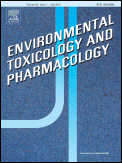
Environmental Toxicology and Pharmacology
Empowering research on environmental challenges.Environmental Toxicology and Pharmacology, published by Elsevier, is a leading journal dedicated to advancing our understanding of the effects of environmental pollutants on biological systems. With an ISSN of 1382-6689 and an E-ISSN of 1872-7077, this journal covers a wide range of studies related to toxicology, pharmacology, and environmental health. The journal is classified as Q2 in key categories such as Health, Toxicology and Mutagenesis and Medicine (miscellaneous), and sits impressively in Q1 for Toxicology, reflecting its strong impact in the field. As of 2023, it ranks #30 out of 133 in Toxicology and #40 out of 148 in Health, indicating its high relevance and contribution to research. While the journal is not currently open access, it remains a pivotal resource for researchers, professionals, and students seeking to explore the intricacies of environmental health effects. Its commitment to publishing high-quality peer-reviewed research positions it as a crucial platform for scientific dialogue and discovery.